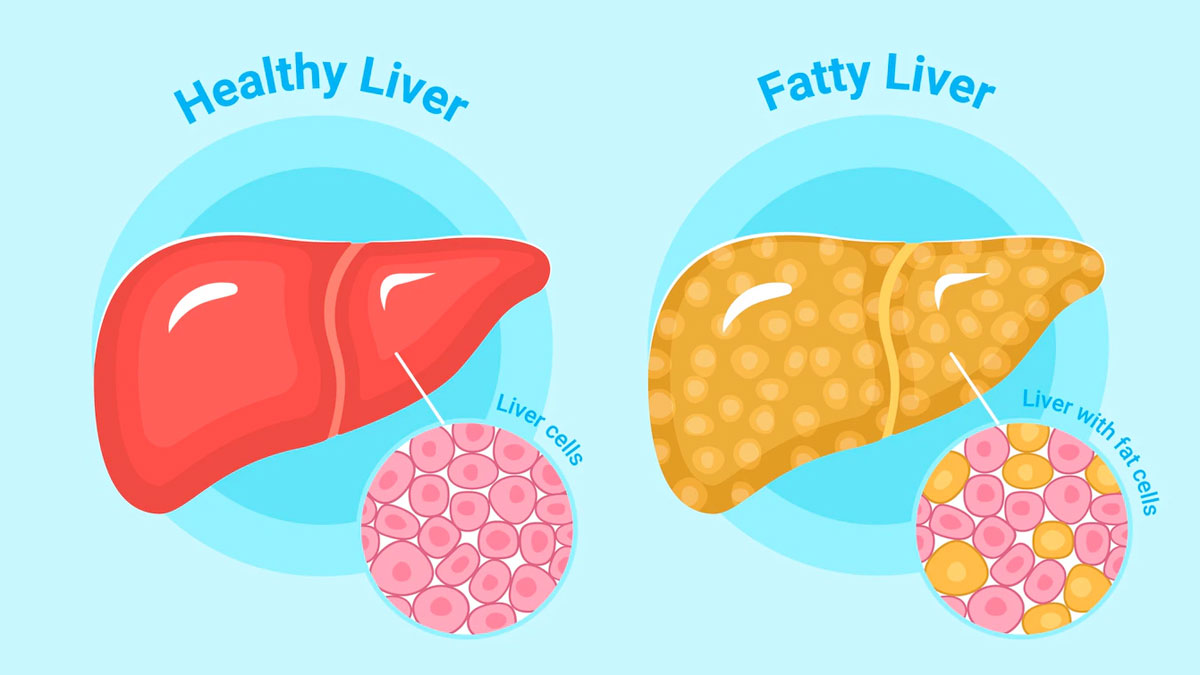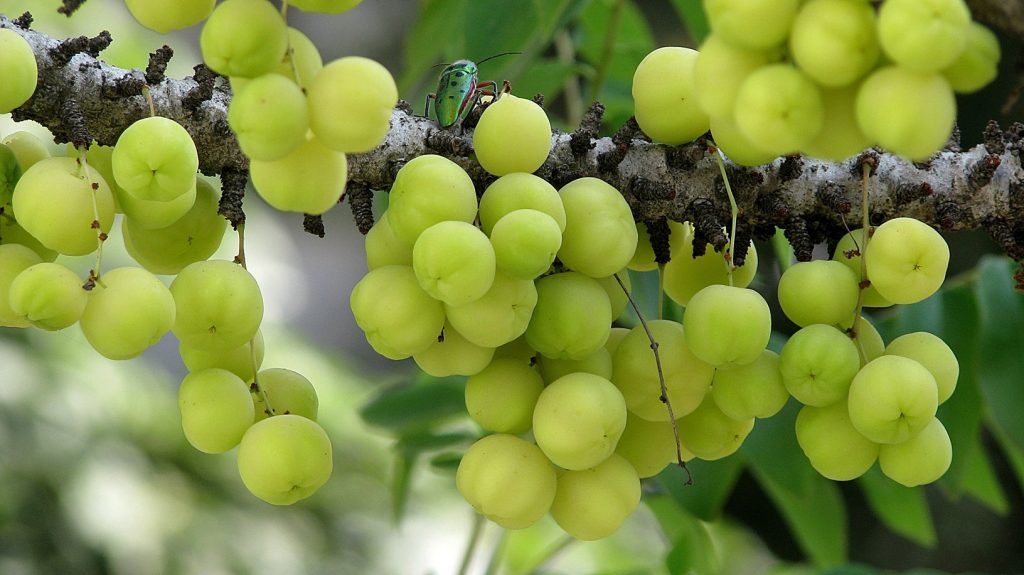Did you know that fatty liver disease is a condition that affects millions of people worldwide? In Ayurveda, fatty liver disease is known as Yakrit Vriddhi.
How to cure fatty liver? Dietary modifications are essential for managing fatty liver disease, which can be reversible with the right approach. If you have been diagnosed with fatty liver disease, modifying your lifestyle, adopting a healthy diet, &, if necessary, taking prescribed medications are essential steps to improving your liver health.

Let's explore a comprehensive guide to Fatty liver disease & its best dietary & lifestyle practices & a sample fatty liver diet chart.
What is Fatty Liver Disease?
Fatty liver disease, also referred to as hepatic steatosis, is a condition characterized by fat accumulation in the liver. This can result in inflammation & fibrosis, which can cause liver damage over time. There are two types of fatty liver disease (hepatic steatosis):
1. Alcoholic fatty liver disease (or alcoholic steatohepatitis) is the initial stage of alcohol-related liver disease. It is caused because of excessive alcohol consumption. If alcohol consumption is not reduced or stopped, it can progress to more severe types of liver disease.
2. Non-alcoholic fatty liver disease (NAFLD) is the most common fatty liver disease not caused by alcohol consumption. It is often associated with insulin resistance, metabolic syndrome, & obesity. NAFLD can also progress to non-alcoholic steatohepatitis (NASH), a more severe form of liver disease that can cause liver failure.
Fatty Liver Causes: What Factors Are Associated With Fatty Liver Disease?
Several factors may raise the risk of fatty liver disease, but its exact cause is unknown. The causes include:
- Obesity
- Insulin resistance
- Syndrome metabolic
- Type 2 diabetes
- High blood pressure
- High cholesterol
- Rapid weight loss
- Malnutrition
- Certain medications
- Viral hepatitis
Symptoms of Fatty Liver Disease

Early-stage fatty liver disease is frequently asymptomatic. However, as the condition worsens, you may experience the following symptoms:
- Fatigue or Weakness
- Weight loss
- Abdominal pain
- Jaundice (skin & eye discoloration)
- Leg & ankle swelling
- Confusion & difficulty concentrating
Severity of Fatty Liver Disease & Its Grades
Understanding the severity of the condition is essential for planning appropriate dietary & lifestyle changes. Fatty liver disease occurs when excess fat accumulates in the liver cells.
- Grade 1 Fatty Liver is the mildest form, characterized by minimal fat deposits in the liver.
- Fatty Liver Grade 2 indicates moderate fat accumulation.
- Fatty Liver Grade 3 represents severe fatty liver disease.
What is fatty liver grade 1? Fatty liver disease can be diagnosed through a blood test, ultrasound, or liver biopsy. The condition is graded on a scale from 1 to 3, with grade 1 representing the mildest form of the disease.
Hepatomegaly with fatty liver grade 1 is the medical term for an enlarged liver. An enlarged liver is indicative of an underlying condition, such as liver disease, congestive heart failure, or cancer. Treatment involves finding & treating the cause.
How To Reduce Fatty Liver: Treatment Plan For Fatty Liver Disease

The treatment for fatty liver disease varies according to the severity of the disease. In most cases, lifestyle & dietary alterations are the first line of treatment. In severe cases, medication may be recommended.
Lifestyle Modifications:
1. Weight Loss through calorie restriction & regular physical activity helps decrease fat accumulation in the liver cells, alleviating stress on the liver & promoting its recovery.
2. Regular exercise, including both aerobic & resistance training, improves insulin sensitivity, promotes weight loss, & reduces the liver fat content. It also helps in maintaining healthy body weight & overall metabolic health.
3. Avoiding alcohol consumption is essential for successful treatment because it directly damages liver cells & worsens liver inflammation & scarring. It is important to seek professional help or support groups to manage alcohol addiction.
4. Effective diabetes management is vital for treating non-alcoholic fatty liver disease (NAFLD) since there is a strong association between insulin resistance & liver fat accumulation. Maintaining blood sugar levels through medication, lifestyle modifications, & dietary modifications is essential for managing NAFLD.
5. Lowering cholesterol levels, especially LDL cholesterol (considered "bad" cholesterol), can help reduce the risk & progression of fatty liver disease..
Quitting Smoking promotes liver health & reduces the risk of further liver complications.
6. Engaging in stress management techniques such as yoga, meditation, deep breathing exercises, or seeking professional support can help reduce stress levels & improve overall well-being. Chronic stress has been associated with the development & progression of fatty liver disease.
7. Getting good sleep is crucial for liver health & overall metabolic function. Lack of sleep has been associated with increased liver fat accumulation & insulin resistance.
8. Intermittent Fasting is a dietary routine that involves alternating periods of fasting & eating. It has shown favorable results in reducing liver fat & improving liver function. It can help improve insulin sensitivity, promote weight loss, & reduce inflammation in the liver.
Fatty Liver Dietary Modifications:

A well-planned diet (foods to eat & foods to avoid with fatty liver) plays an essential part in managing fatty liver disease. It emphasizes liver wellness, inflammation reduction, & weight loss aid. The goal of a diet for fatty liver is to reduce the intake of items that worsen liver disease while boosting the consumption of nutrient-dense, liver-friendly choices.
1. Drinking plenty of water can help flush (remove) toxins out of your body & enhance liver function. Aim to drink at least 8 glasses of water per day.
2. A diet rich in fruits & vegetables provides essential antioxidants, vitamins, & minerals. These nutrients help reduce inflammation in the liver & protect against liver damage caused by oxidative stress.
3. Whole grains, such as whole wheat, oatmeal & brown rice, are high in fiber & can help reduce liver fat accumulation. Fiber aids digestion promotes satiety, & regulates blood sugar levels, which are beneficial for managing fatty liver disease.
4. Including lean protein sources in the diet, such as legumes, fish, tofu, & poultry, provides essential amino acids without excessive saturated fat. Lean proteins support liver health & repair while reducing the workload on the liver.
5. Healthy fats, such as the monounsaturated and polyunsaturated fats found in avocados, olive oil, almonds, and seeds, have been linked to enhanced liver function and decreased inflammation. These fats should be consumed moderately as part of maintaining a balanced diet.
6. Probiotics, beneficial bacteria that promote gut health, have been studied for their potential effects on fatty liver disease that may help improve liver enzymes, reduce liver fat accumulation, & alleviate inflammation in the liver.
7. Avoid foods bad for liver, such as alcohol, sugary foods, fried foods, & processed foods, because it can exacerbate the condition if you have been diagnosed with fatty liver disease.
Please note that although modifications to your lifestyle & eating habits might improve fatty liver disease, consulting with a healthcare practitioner or qualified dietitian for personalized advice & counseling is crucial.
Home Remedies to Cure Fatty Liver:

"Yakrit Vriddhi" is a condition in which the liver becomes enlarged due to fat accumulation. This condition is caused by an imbalance in the doshas, particularly the Kapha dosha. Ayurveda offers several remedies for the treatment of Yakrit Vriddhi. Some remedies, such as:
1. Triphala (combines of 3 fruits - Amla, Haritaki, & Bibhitaki) has antioxidant & anti-inflammatory properties. These fruits also contain bioactive compounds such as polyphenols, flavonoids, & vitamin C, which may help protect liver cells from oxidative stress & reduce inflammation.
2. Kutki is an herb known for its hepatoprotective properties that are considered to stimulate liver function & enhance bile production, which aids in the digestion & elimination of fats. The active compounds in Kutki, such as kutkin & picrorhizine, may possess anti-inflammatory & antioxidant effects that could benefit the liver.
3. Punarnava is an herb commonly used in Ayurveda for liver disorders. It is considered to have diuretic properties that may help remove excess fluid from the body, potentially lowering liver congestion. Punarnava also contains antioxidants that may protect liver cells from damage.
4. Guduchi ( Tinospora Cordifolia) is an herb revered for its immunomodulatory & hepatoprotective effects. It helps improve liver function by reducing inflammation & supporting the regeneration of liver cells. Guduchi contains active compounds such as alkaloids, flavonoids, & terpenoids that may contribute to its beneficial effects on the liver.

5. Aloe Vera is a plant known for its various health benefits. It may have hepatoprotective properties due to its antioxidant & anti-inflammatory effects. Aloe Vera, gel or juice consumption, stimulates liver health by reducing inflammation & enhancing detoxification processes.
6. Turmeric (bright yellow spice) contains an active compound called curcumin, which has powerful anti-inflammatory & antioxidant properties. Curcumin is considered to modulate several signaling pathways involved in liver inflammation & damage. Consuming turmeric powder or curcumin capsules may help reduce inflammation in the liver.
7. Licorice root contains glycyrrhizin, a compound with anti-inflammatory properties. Licorice may help improve liver function by reducing liver inflammation & promoting the production of liver-protective compounds. It is important to note that licorice should be used cautiously, as excessive or prolonged use can have adverse effects.
8. Bhringraj (Eclipta alba) is an herb used in Ayurveda for liver disorders. It is considered to have hepatoprotective, anti-inflammatory, & antioxidant properties that may help improve liver function by reducing inflammation & oxidative stress in the liver.
9. Amalaki (Indian gooseberry or Amla) is a rich source of vitamin C & antioxidants. It is considered to have hepatoprotective effects by reducing liver inflammation & oxidative stress. The active compounds in Amalaki, such as tannins & flavonoids, may contribute to its potential benefits for the liver.

10. Brahmi is an herb traditionally used in Ayurveda for liver disorders. It is considered to have antioxidant & anti-inflammatory properties that may help protect liver cells from oxidative stress & inflammation damage. Brahmi may also support liver function by modulating certain enzymes involved in detoxification processes.
11. Milk thistle contains an active compound termed silymarin, which has antioxidant & anti-inflammatory properties. Silymarin has been shown to protect liver cells, promote liver regeneration, & reduce liver inflammation.
12. Dandelion root has been used traditionally as a liver tonic. It contains compounds that may help support liver function, promote bile production, & aid in detoxification.
13. Green tea is rich in catechins, an antioxidant with anti-inflammatory & hepatoprotective properties. Regular consumption of green tea demonstrated reduced liver fat content & improved liver function markers.
14. Kalmegh is a medicinal herb known for its hepatoprotective properties. It contains active compounds like andrographolide, which have shown anti-inflammatory & antioxidant effects. These properties may help reduce liver inflammation & improve liver function, potentially benefiting individuals with fatty liver disease. Buy Namhya Kalmegh Plant Powder to naturally protect the liver against damage.
15. Haritaki or Harad (part of triphla churana) is an herb known for its hepatoprotective & antioxidant properties. It has been traditionally used to support liver health. Haritaki contains various bioactive compounds, including tannins, chebulagic acid, & chebulinic acid, which may contribute to its beneficial effects on the liver.
Fatty Liver Diet Chart Indian
|
Meal Options |
Option 1 |
Option 2 |
Option 3 |
Option 4 |
Option 5 |
|
Breakfast |
Vegetable Poha + Green Tea/ Namhya Liver Cleanse Tea |
Vegetable Upma + Buttermilk/ Namhya Liver Cleanse Tea |
Oats Idli + Coconut Chutney + Namhya Liver Cleanse Tea |
Vermicelli Upma + Green Tea/ Namhya Liver Cleanse Tea |
Ragi Dosa + Sambar + Green Tea/ Namhya Liver Cleanse Tea |
|
Mid-Morning Snack |
Apple slices + Guduchi powder |
Carrot sticks + Hummus + Aloe Vera juice |
Mixed Berries + Turmeric powder |
Cucumber slices + Yogurt + Licorice powder |
Almonds + Bhringraj powder |
|
Lunch |
Brown Rice + Dal + Vegetable Curry |
Roti + Palak Paneer + Salad |
Quinoa Pulao + Rajma Curry + Amalaki powder |
Bajra Roti + Lauki Curry + Salad + Brahmi powder |
Chapati + Chole Curry + Cucumber Raita + Guduchi powder |
|
Evening Snack |
Roasted Chana |
Tomato Cucumber Salad + Turmeric powder |
Mixed Sprouts Salad |
Whole Wheat Bread + Tomato Slices + Green Tea |
Buttermilk + Triphala powder |
|
Dinner |
Grilled Fish + Stir-Fried Vegetables |
Chicken Biryani + Raita + Turmeric powder |
Tofu Stir-Fry + Brown Rice |
Vegetable Khichdi + Curd + Brahmi powder |
Spinach Curry + Roti + Guduchi powder |
|
Bedtime Snack |
Namhya Liver Cleanse Tea |
Namhya Liver Cleanse Tea |
Namhya Liver Cleanse Tea |
Namhya Liver Cleanse Tea |
Namhya Liver Cleanse Tea |
Note: This is just a sample diet chart & should be customized based on individual preferences, dietary restrictions, & any underlying medical conditions. Consult a certified dietician or healthcare expert for personalized guidance & to make sure the diet plan fulfills your requirements. Herbs should be added to the diet with the guidance of a medical practitioner to avoid drug interactions & other health issues.
Nourish & Cleanse Your Liver with Namhya Liver Cleanse Tea
Looking for a natural solution to support your liver? For a healthy liver cleanse, brew the Namhya Liver Cleanse Tea. This tea is a heavenly blend of Harad, Milk Thistle, Manjishtha, Pippali, & other potent Ayurvedic herbs.

Sip on by steeping a teaspoon of leaves in water to detoxify your liver, alleviate conditions like cirrhosis & jaundice, & even improve heart health by lowering cholesterol levels. Add jaggery or honey for a taste. Drink it twice daily for probably 3-6 months to witness remarkable results.
Order your Namhya Liver Cleanse Tea & other products today & experience the transformative magic of Ayurveda.


